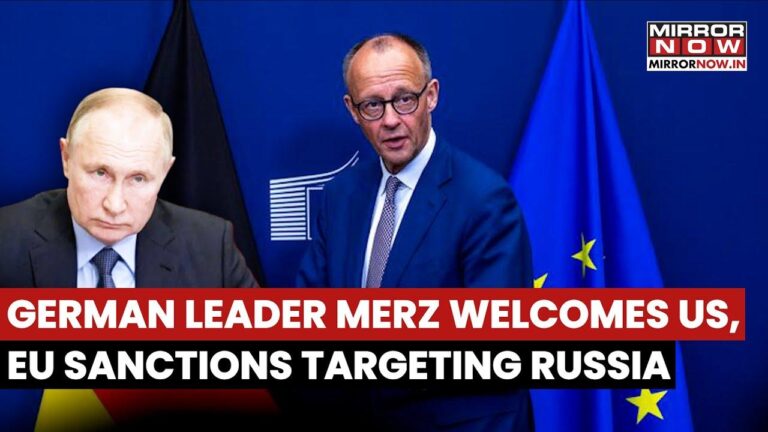In a significant diplomatic move, German and French leaders are advocating for the implementation of secondary sanctions against individuals and entities that support the Russian government amidst ongoing geopolitical tensions. This initiative, reported by The Japan Times, seeks to increase pressure on Moscow by targeting its financial backers and allies in various sectors. As Europe grapples with the ramifications of the conflict in Ukraine, the push for these sanctions highlights a renewed commitment to collective action among Western nations in deterring aggression and reinforcing international norms. The proposal underscores not only the urgency of the situation but also the complexities involved in crafting effective sanctions that navigate the intricacies of global finance and diplomacy.
German and French Leaders Advocate for Stronger Economic Measures Against Russian Supporters
In a coordinated effort to strengthen their stance against Russian aggression, leaders from Germany and France recently convened to discuss the implementation of stringent economic measures targeting individuals and entities supporting the Kremlin. This initiative, part of a broader strategy to bolster European resilience, emphasizes the need for secondary sanctions, aimed at disruptively targeting financial networks that sustain Russia’s war efforts. The proposals seek to address both direct and indirect support mechanisms, leveling the playing field for those supporting Ukraine’s sovereignty and reinstating the principle of accountability on the international stage.
Key points from the discussions included:
- Implementing Secondary Sanctions: Targeting businesses and officials in allied countries that facilitate Russian actions.
- Strengthening Trade Restrictions: Expanding the list of goods and services that can no longer be exported to Russia.
- Enhancing Financial Oversight: Increasing scrutiny on financial transactions that may indirectly benefit the Russian economy.
| Country | Possible Impact of Sanctions |
|---|---|
| Germany | Reduction in energy imports; promote green energy alternatives. |
| France | Trade adjustments; greater reliance on EU partnerships. |
Implications of Secondary Sanctions on International Trade Relations
The push by German and French leaders for secondary sanctions on Russian backers indicates a significant shift in international trade dynamics. Secondary sanctions, which impose penalties on entities that engage in business with sanctioned individuals or countries, could fundamentally reshape diplomatic relations. Nations that rely on trade with Russia may find themselves caught in a complex web of compliance, facing tough choices between economic benefits and political alignment. Such measures could lead to a reevaluation of existing trade agreements and partnerships, particularly for countries heavily interconnected with Russian markets.
As these sanctions gain traction, several consequences are likely to emerge:
- Increased Compliance Costs: Businesses may need to invest in monitoring and compliance systems to avoid penalties.
- Supply Chain Disruptions: Industries relying on Russian resources could face challenges, prompting a diversification of suppliers.
- Political Tensions: Nations opposing these sanctions might retaliate, leading to geopolitical friction.
| Impacted Sectors | Potential Outcomes |
|---|---|
| Energy | Rise in prices, shift to alternative sources |
| Finance | Increased scrutiny on transactions |
| Agriculture | Export challenges, changes in trade flows |
Strategies for Unifying European Response to Russian Aggression
The recent push by German and French leaders for secondary sanctions on Russian backers signifies a pivotal step in consolidating the European response to ongoing aggression. Secondary sanctions, aimed at individuals and entities that support Russia, could create a robust front against those exacerbating the conflict. Such measures are intended not only to weaken the Russian economy but also to reduce support for its military operations. To effectively implement these sanctions, European nations must align their respective policies, ensuring that all member states participate and enforce the measures uniformly.
Key strategies for achieving this unification may include:
- Enhanced Diplomatic Coordination: Frequent meetings among EU foreign ministers to discuss strategy and share intelligence can bolster collaborative efforts.
- Public Awareness Campaigns: Educating citizens about the implications of Russian aggression can cultivate solidarity and support for sanctions.
- Economic Partnerships: Strengthening economic ties within the EU and among NATO allies can create a unified front that diminishes dependency on Russian resources.
| Strategy | Expected Outcome |
|---|---|
| Enhanced Diplomatic Coordination | Unified foreign policy and stronger sanctions enforcement |
| Public Awareness Campaigns | Increased public support for sanctions |
| Economic Partnerships | Reduced dependency on Russian supplies |
Evaluation of Potential Impact on the Russian Economy and Global Markets
The push by German and French leaders for secondary sanctions on Russian backers signals a potential shift in the geopolitical landscape, with far-reaching consequences for the Russian economy. These new measures aim to target not just the Russian government but also the financial entities and businesses that support it, which could exacerbate the ongoing economic strain. As Western nations tighten their grip, key sectors of the Russian economy may face significant disruptions, including:
- Energy Exports: Continued restrictions could hamper oil and gas revenues, crucial for funding the state budget.
- Financial Stability: Increased isolation of Russian banks may lead to a liquidity crisis.
- Consumer Goods Inflation: Dependency on imports could fuel price hikes for everyday goods.
On a global scale, these developments are likely to ripple through markets, affecting supply chains and global trade flows. Nations reliant on Russian exports might experience turbulence in their own economies as they navigate the effects of reduced availability. Potential impacts include:
- Increased Energy Prices: A potential spike in oil prices globally if Russian crude is further curtailed.
- Market Volatility: Heightened uncertainty could lead to fluctuations in equity markets worldwide.
- Shifts in Trade Alliances: Countries may seek alternative energy sources, altering global trade dynamics.
| Sector | Potential Impact |
|---|---|
| Energy | Decline in Russian exports; potential for surging global prices. |
| Finance | Isolation of banks may lead to liquidity issues and market unrest. |
| Consumer Goods | Inflationary pressure from rising import costs and scarcity. |
Insights and Conclusions
In conclusion, the concerted efforts by German and French leaders to advocate for secondary sanctions on Russian backers underscore the ongoing commitment of European nations to respond robustly to the conflict in Ukraine. As these nations navigate complex geopolitical landscapes, the implications of such measures could reshape economic relationships and influence diplomatic ties across the continent. The drive for greater accountability highlights a unified stance against aggression, signaling a critical moment in international diplomacy as Europe seeks to uphold democratic values and stability. As these developments unfold, the global community will be closely watching to see how these sanctions will impact Russia’s financial networks and the broader geopolitical landscape.




